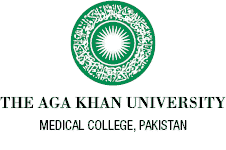Conference Day 2: Themes
The conference day was structured around distinct themes for each session on non-communicable diseases, maternal and child health, and infectious diseases. Each theme kicked off with a keynote presentation, followed by a session on methodology, an application session and finally concluded with a panel discussion. This allowed for an in-depth examination of healthcare issues and innovative approaches to their solutions.
Non-Communicable Diseases
The Non-communicable disease's theme session was chaired by Dr. Faisal Khan, Director of the Precision Medicine Lab at NCBC. Dr. Mark Sendak, the Population Health, and Data Science Lead at the Duke Institute for Health Innovation, delivered an insightful keynote talk on predicting decompensation in the Cardiac Care Unit.
Following Dr. Sendak, Dr. Bashir Hanif, the Executive and Medical Director at the Tabba Heart Institute in Karachi led the methodology session. Dr. Hanif shed light on data challenges in Non-Communicable Diseases and shared the inspiring story of establishing the Cardiac Registry of Pakistan (CROP).
Dr. Christine Ngaruiya, Assistant Professor in the Department of Emergency Medicine at Yale University, presented the Application Session via a video call. Dr. Ngaruiya talked about the development and use of natural processing tools for understanding sex differences in acute myocardial infarctions.
The first theme concluded with a stimulating panel discussion on leveraging data-driven decision-making to enhance NCD outcomes. The sessions collectively provided valuable insights into the impactful application of data science approaches in the realm of non-communicable diseases.
Maternal and Child Health
The second theme of the conference was maternal and child health led by Dr. Zahra Hoodbhoy, Assistant Professor of Paediatrics and Child Health at Aga Khan University. The keynote on utilizing data science approaches to improve maternal and child health outcomes was delivered by Dr. Bart Bijnens, an ICREA Research Professor from Institut d'Investigacions Biomèdiques August Pi i Sunyer (IDIBAPS) in Barcelona, Spain.
Ms. Sheena Gill, the President and CEO of Americas and a founding team member of Cognitive Care, presented the effective use of data analytics in maternal and child health in the methodology session, following which Dr. Imran Nisar, Assistant Professor of Paediatrics and Child Health at Aga Khan University, shared insights on the implementation of big data in maternal and child health.
The last session for the maternal and child health theme was a panel discussion focusing on how health data can empower women and children, thus fostering a thought-provoking exchange of ideas and experiences.
Infectious Diseases
The conference's concluding theme was dedicated to infectious disease prevention. Dr. Nosheen Nasir, Vice Chair of Research and Assistant Professor of Medicine at Aga Khan University, was the moderator for this theme.
The keynote talk was delivered by Dr. Mark Jit, Professor of Vaccine Epidemiology and Head of the Department at the London School of Hygiene and Tropical Medicine. Dr. Jit provided valuable insights into health economic modeling in communicable disease prevention. Following this was a methodology session on infectious disease modeling led by Dr. Bilal Ahmed Usmani, Assistant Professor and Section Head of Community Health Sciences at Aga Khan University. Next, Mr. Ahsan Memon, Chief Executive Officer and Managing Director of EKKEL, discussed data utilization for clinical decision-making, sharing invaluable lessons learned from practical experiences in this field.


